To learn more about Digital Green’s AI-powered platform and how it impacts small-scale farmers in India, Ethiopia, Kenya, Nigeria and Brazil, we encourage you to sign up for our newsletter.
Impact of video advisories dissemination on Climate Smart Agriculture (CSA) practices using digital tools
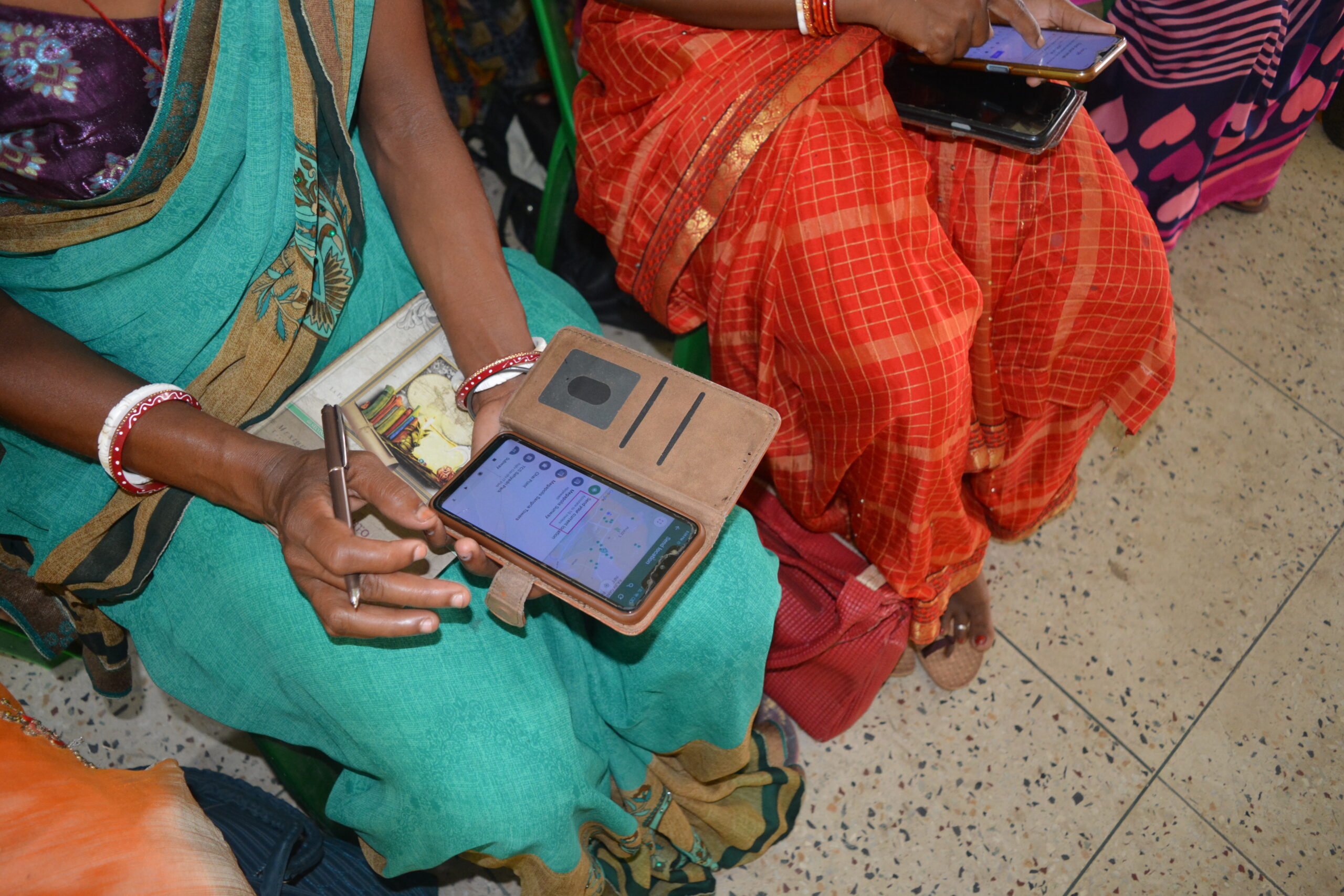
‘The use of videos for community training is helping me reach more farmers at a time, it made my work easy and effective too. I am also observing more farmers coming to the training now,’ says Beena Devi, a Front Line Worker (FLW) from Ranchi district in Jharkhand, India. She is one of the FLWs trained for video dissemination using digital tools under the Digital Empowerment to Enhance Productivity (DEEP) project.
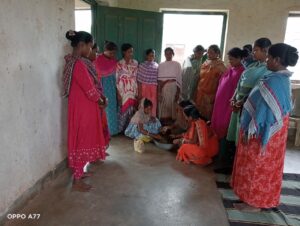
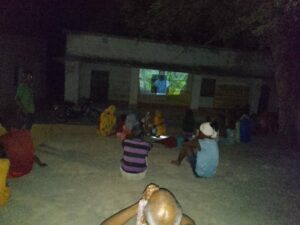 These trained FLWs are disseminating videos on Climate Smart Agriculture (CSA) and allied practices among farmers’ groups in their respective villages for skilling farmers and for improved adoption of practices. Meena Devi, a farmer from Bundu block of Ranchi, shared that ‘adopting the natural farming practices will not only improve our health, but it will also improve the soil fertility. By adopting these practices, I am observing better crop growth and yield as well. There is no pest attack in the crops, and the produce is also tastier than before.’
These trained FLWs are disseminating videos on Climate Smart Agriculture (CSA) and allied practices among farmers’ groups in their respective villages for skilling farmers and for improved adoption of practices. Meena Devi, a farmer from Bundu block of Ranchi, shared that ‘adopting the natural farming practices will not only improve our health, but it will also improve the soil fertility. By adopting these practices, I am observing better crop growth and yield as well. There is no pest attack in the crops, and the produce is also tastier than before.’
In pursuing sustainable agricultural practices amidst the challenges posed by climate change, the video-based extension has emerged as a powerful tool. With the integration of community video approach in the training, the farmers are presented with an unprecedented visually engaging medium to absorb the information, which stands as a distinctive experience for them, thus increasing participation of the farmers in the training.
To cater to the requirement at the field level, video advisories on NPM practices, pigeon pea and paddy cultivation, and strengthening collectives like PG/FPC and Non Timber Forest Products (NTFP) are being disseminated amongst the farmers during the ongoing kharif season. The videos not only enhance the overall learning experience but also allow the participants to revisit the content, reinforcing their understanding. Moreover, the skilled facilitation by the FLWs contributes significantly in maintaining participation, engagement, and attentiveness. As witnessed, there is an encouraging rise in male participation through video dissemination, which is programmatically designed for women groups. This results in increasing household-level discussion and agreement to adopt new practices in farming.
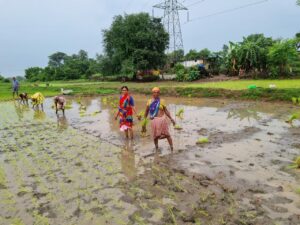 FLW Sunita Devi from Simdega district shares, ‘the male counterparts are also interested in attending the dissemination as they found the videos interesting and useful. They are also getting motivated to adopt the practice of ‘lime application in farmland,’ which they watched during the recent dissemination session in the village. They appreciated the dissemination conducted by me and also the video-based advisories’. This inclusive approach is not only promoting gender equality but also increasing the overall impact of the dissemination initiatives. Among farmers, there is a demand for new videos on crop practices related to millets, Non-Timber Forest Products (NTFP), honey, and vegetables. This growing demand highlights the farmers’ active interest in acquiring knowledge tailored to their specific needs and preferences. As this demand continues to grow, incorporating more video content is assumed to be central to empowering farmers with the knowledge necessary for informed decision-making and optimizing farming practices.
FLW Sunita Devi from Simdega district shares, ‘the male counterparts are also interested in attending the dissemination as they found the videos interesting and useful. They are also getting motivated to adopt the practice of ‘lime application in farmland,’ which they watched during the recent dissemination session in the village. They appreciated the dissemination conducted by me and also the video-based advisories’. This inclusive approach is not only promoting gender equality but also increasing the overall impact of the dissemination initiatives. Among farmers, there is a demand for new videos on crop practices related to millets, Non-Timber Forest Products (NTFP), honey, and vegetables. This growing demand highlights the farmers’ active interest in acquiring knowledge tailored to their specific needs and preferences. As this demand continues to grow, incorporating more video content is assumed to be central to empowering farmers with the knowledge necessary for informed decision-making and optimizing farming practices.
During the field visits and interaction with the FLWs and farmers, it was evident that there has been a considerable increase in the adoption of recommended practices amongst the farmers. By leveraging the visual medium, the videos effectively communicate the intricacies of CSA methods, making them accessible and relatable. The awareness and understanding of practices that could withstand the vagaries of climate change have notably increased among both FLWs and farmers. FLW Beena Devi mentions: ‘By watching the videos, practice adoption has become easier for the farmers, and almost more than 80% of the farmers are adopting the recommended practices.’ She is also preparing Neemastra, Jeevamrit, and other organic formulations for fertility and pest control and selling them to the farmers so they can get them handy when required. Being a farmer as well, she adopts the practices in her field too.
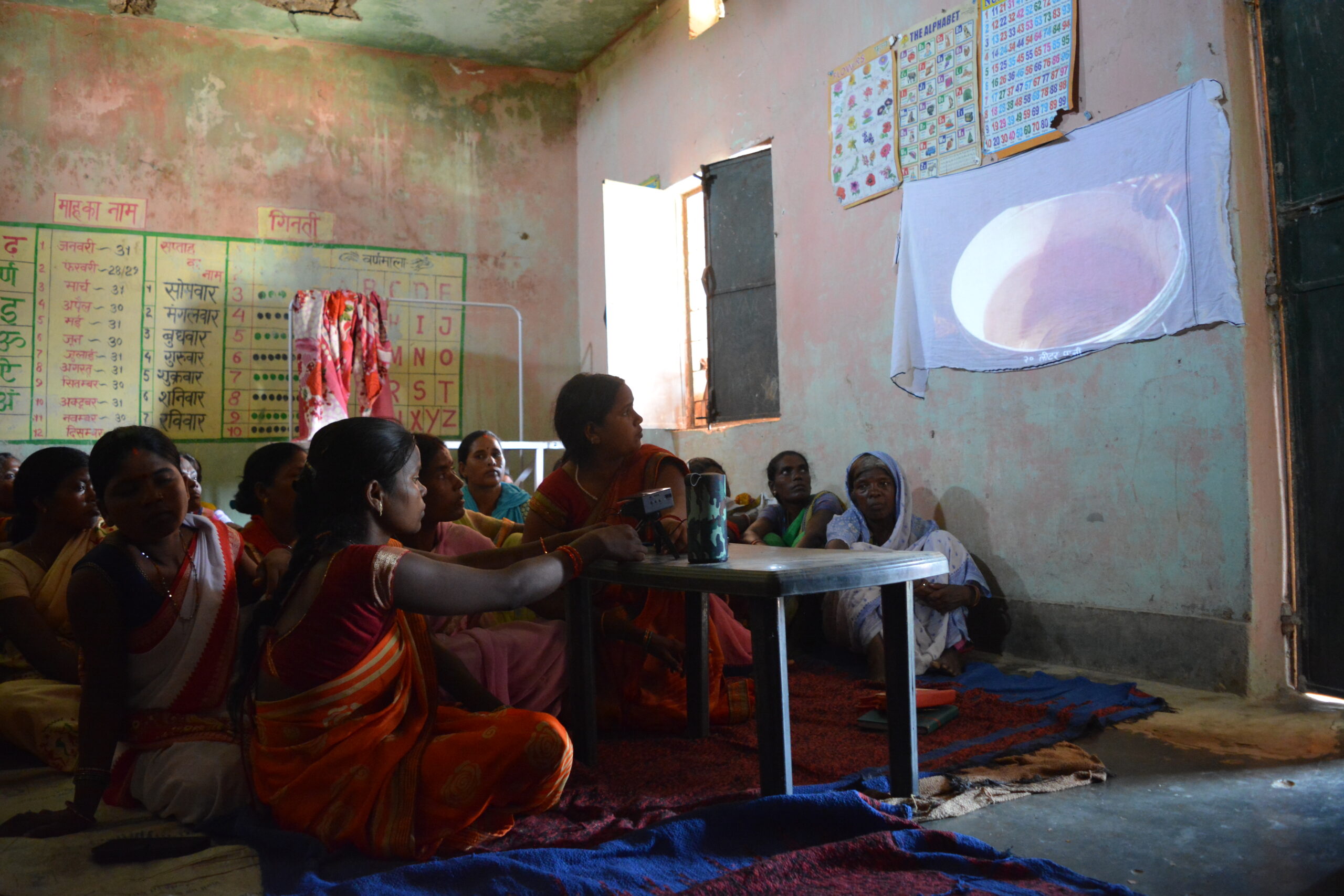
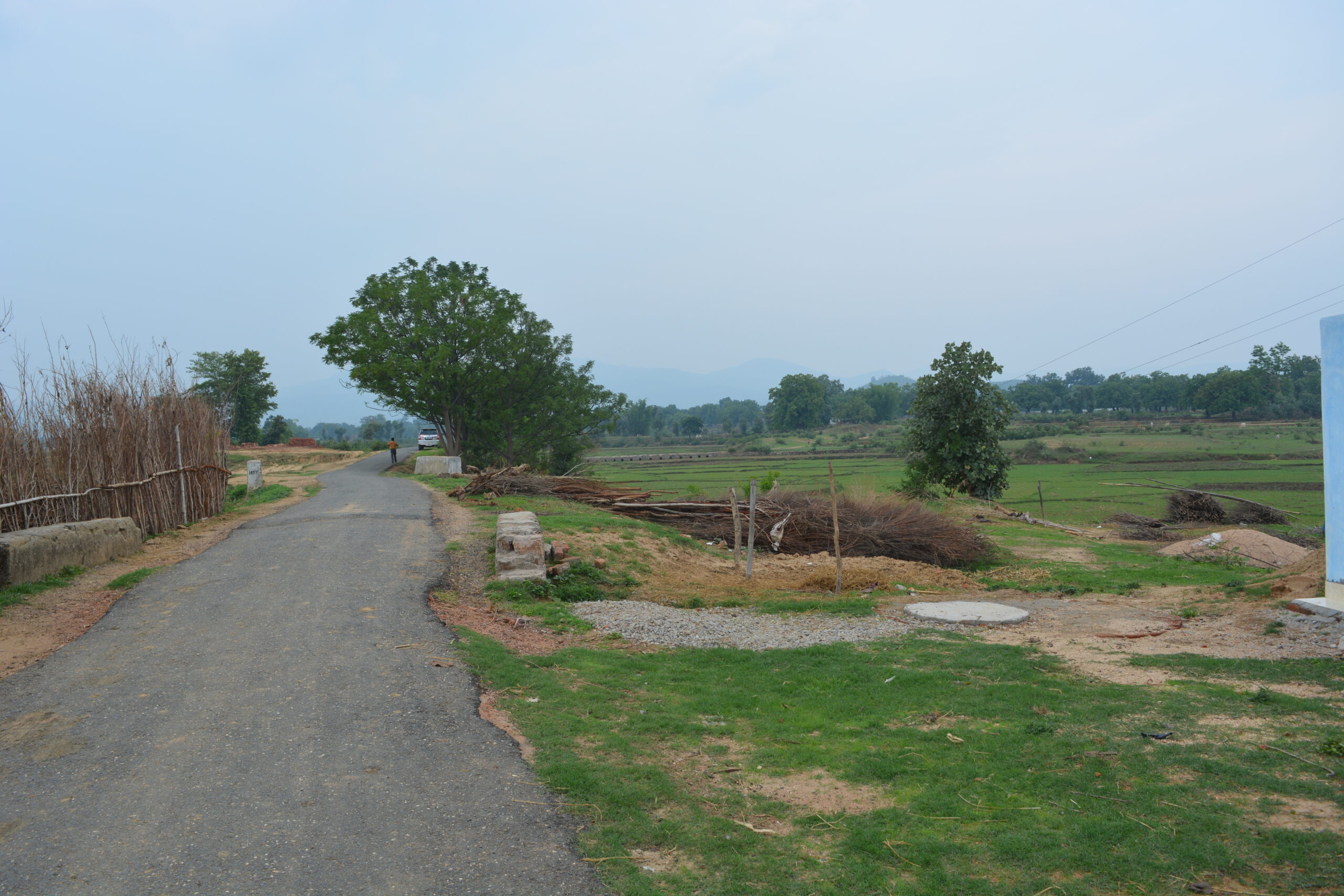 Notably, as the transplantation of paddy has experienced delays due to late monsoon, to counter this challenge, farmers are diversifying their cultivation by prioritizing seasonally appropriate vegetable crops, both to align with changing patterns and to generate income. Millets, at present, have gained prominence as they can thrive in less water, as there is demand in the market. The farmers are now adopting water-saving practices in irrigation by avoiding overwatering and appropriate scheduling of the same, soil conservation approaches, inter-cropping strategies, and other related practices as the videos function as a bridge, simplifying these approaches and offering practical steps for their successful application. Farmers are now better equipped to navigate the complexities of contemporary agriculture while simultaneously addressing the challenges presented by a changing climate. They are leaning towards climate-friendly techniques like seed treatment using bio-formulations, line-sowing, bio-fertilizers, pesticides, and inter-cropping. This collective effort signifies a trajectory toward resilience and sustainability in agriculture.
Notably, as the transplantation of paddy has experienced delays due to late monsoon, to counter this challenge, farmers are diversifying their cultivation by prioritizing seasonally appropriate vegetable crops, both to align with changing patterns and to generate income. Millets, at present, have gained prominence as they can thrive in less water, as there is demand in the market. The farmers are now adopting water-saving practices in irrigation by avoiding overwatering and appropriate scheduling of the same, soil conservation approaches, inter-cropping strategies, and other related practices as the videos function as a bridge, simplifying these approaches and offering practical steps for their successful application. Farmers are now better equipped to navigate the complexities of contemporary agriculture while simultaneously addressing the challenges presented by a changing climate. They are leaning towards climate-friendly techniques like seed treatment using bio-formulations, line-sowing, bio-fertilizers, pesticides, and inter-cropping. This collective effort signifies a trajectory toward resilience and sustainability in agriculture.
To complement the video-based advisory sharing, WhatsApp-based chatbot is also being implemented during the current kharif season, where farmers could access real-time specific crop advisories on paddy and pigeon pea based on their need. The bot is now live for farmers, where the agriculture extension workers are taking the lead to spread this service among all the farmers in their respective villages, helping them get the videos on the required crop and crop stages. They are also demanding additional crop advisories, which reflects their interest and usefulness of the digital tools.
 Project DEEP is being implemented for the small & marginal farmers of Jharkhand in collaboration with Jharkhand State Livelihood Promotion Society (JSLPS) under Mahila Kisan Sashaktikaran Pariyojana (MKSP) and with the generous funding support of Accenture Solutions Pvt. Ltd. The project incorporates Digital Green’s highly acclaimed video-based approach (VBA) for developing appropriate content based on formative research, producing short videos to demonstrate the application of new methods, and disseminating the videos to farmers. After successful completion of year 1 implementation of the DEEP project in 33 blocks of 8 districts, reaching 50k+ farmers during 2022-23, the project is now being scaled to additional 20 blocks, altogether covering 53 blocks from 13 districts with a target to reach additional 50k farmers in the year 2023-24.
Project DEEP is being implemented for the small & marginal farmers of Jharkhand in collaboration with Jharkhand State Livelihood Promotion Society (JSLPS) under Mahila Kisan Sashaktikaran Pariyojana (MKSP) and with the generous funding support of Accenture Solutions Pvt. Ltd. The project incorporates Digital Green’s highly acclaimed video-based approach (VBA) for developing appropriate content based on formative research, producing short videos to demonstrate the application of new methods, and disseminating the videos to farmers. After successful completion of year 1 implementation of the DEEP project in 33 blocks of 8 districts, reaching 50k+ farmers during 2022-23, the project is now being scaled to additional 20 blocks, altogether covering 53 blocks from 13 districts with a target to reach additional 50k farmers in the year 2023-24.